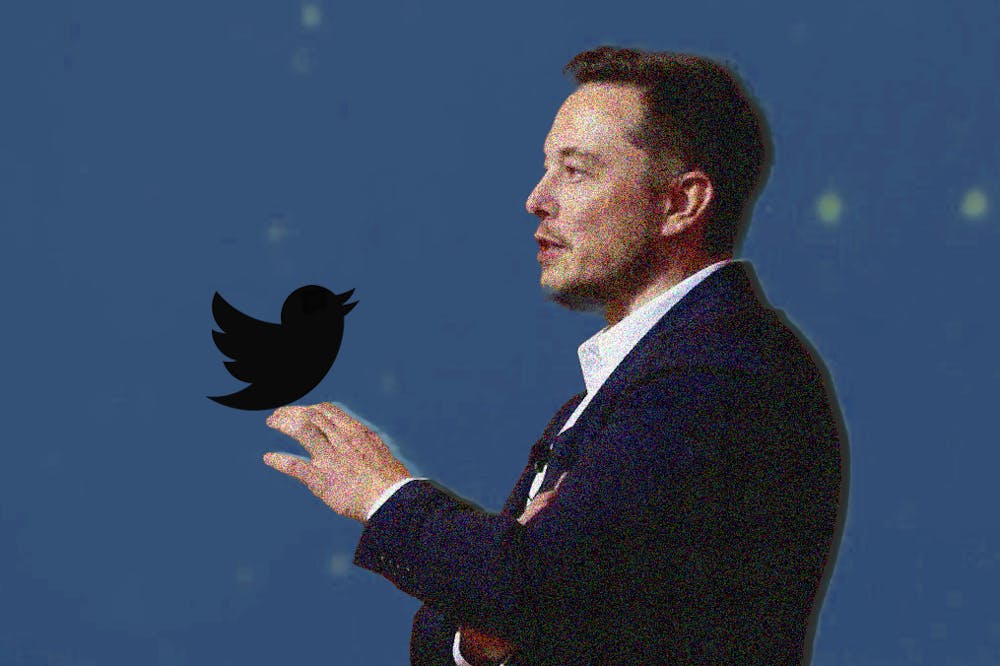
Since 1997 College and Wharton graduate Elon Musk’s acquisition of X (formerly known as Twitter) last October, the platform’s advertising revenue has plummeted by nearly half. After purchasing the app for $44 billion, it is now worth only approximately $15 billion a year later — a third of its original value.
Referring to himself as a “free speech absolutist,” Musk’s main objective with X was to reshape the app into a digital town square characterized by minimal censorship — a space where nothing would be off limits for users.
Rolling back on moderation standards, however, didn’t create the appealing oasis for free expression that Musk envisioned. Advertisers were quickly alienated while Musk invited back suspended users such as Ye and Donald Trump, engaged in chaotic staffing cuts, mandated harsh work conditions, and propagated various conspiracies. Companies jumped at the opportunity to create their rival versions of X, and users jumped at the opportunity to download these alternatives; Meta’s nascent app Threads had 70 million people register within the first two days of launching.
Adverts comprise 90% of the company’s revenue, making the state of X's advertising pivotal to its success. But since Musk’s takeover, X has produced an incessant cesspool for hate speech, causing companies — specifically high-paying advertisers — to abandon the app as both safety and trust have progressively eroded. X is experiencing unprecedented levels of hate speech since the acquisition.
The shift in content moderation prompted anti-hate groups such as the Anti-Defamation League to scrutinize the app’s surge in hate speech and content moderation policies. Over a century old, the ADL is the leading Jewish organization advocating for civil rights and combating all forms of antisemitism or bias by outwardly challenging bigotry when it arises.
This past May, the ADL published a piece analyzing the “threads of hate” on X, revealing a normalization of harmful ideologies without regulation. Instead of assuming responsibility for driving X into the ground since purchasing it almost a year prior, Musk began scapegoating the widely respected Jewish civil group for a 60% drop in ad revenue after they rightfully illuminated the rise in hate speech on the platform.
Although Musk chose to single out the ADL specifically, it is not the sole organization to scrutinize Musk’s decisions on the app: The Southern Poverty Law Center also has released statements denouncing Musk’s courses of action as the new proprietor among many organizations and research institutions censuring Musk’s laissez-faire-absolutist speech policies.
By choosing to engage in a public feud with a Jewish organization, Musk is opening the floodgates for white nationalists to justify antisemitic discourse. Musk’s allegations, which then spawned the dog whistle campaign #BantheADL, were enthusiastically embraced by antisemites, conspiracy theorists, and white supremacists alike. Ironically, Musk is now legitimizing the ADL’s very critiques of the app’s lack of content management.
As one of the wealthiest, most influential figures in the world, Musk’s amplification of the hashtag #BantheADL poses great dangers to the Jewish community. To make his intent clear, he engaged with a white supremacist’s tweet of the hashtag.
Consistent circulation of conspiracies, archetypal tropes, and blatant discrimination normalize antisemitism, increasing comfortability in expressing these views as they are reinforced by high-profile figures like Musk to justify their bigotry. By attributing his company’s flaws to Jews, Musk is reviving old tropes used to justify antisemitism, positing Jews as villains in power controlling the media and banks behind-the-scenes. These recurring nodes of hate are similar to sentiments spewed by Ye on the app last year, and analogous to classic antisemitic conspiracy theories disseminated during World War II.
But the fact of the matter is, speech is generative of action. In the digital age we are in, dialogue across social media inherently proliferates into societal frameworks, and people look to influential figures to empower their beliefs — much like how white supremacists cited Ye last year. Antisemitic incidents are skyrocketing in the United States ,and researchers find that antisemitic content on platforms like X only instigate such behaviors. Since the buyout, the volume of antisemitic tweets have increased over twofold within the unrestrained forum.
Musk stands as the exclusive source behind X's demise, yet instead of assuming responsibility for the decline in users and ad revenue, he is deflecting blame against a Jewish organization. This not only appears hypocritical from the free speech lens he advocates for, but it also seems like a method to preemptively divert and reshape the storyline surrounding Musk’s involvement with X — especially in case of company failure under his poor management.

RIANE LUMER is a College senior studying political science and journalistic writing from Huntingdon Valley, Pa. Her email address is rlumer@sas.upenn.edu.
The Daily Pennsylvanian is an independent, student-run newspaper. Please consider making a donation to support the coverage that shapes the University. Your generosity ensures a future of strong journalism at Penn.
Donate







